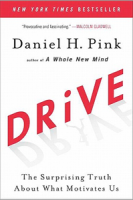 Drive: The Surprising Truth About What Motivates Us by Daniel H. Pink (Riverhead Books, 2009)
Drive: The Surprising Truth About What Motivates Us by Daniel H. Pink (Riverhead Books, 2009)
Drive is yet another book I read because it was on my son-in-law's Amazon wish list. We gave it to him for Christmas, and I hope he reads it soon so my daughter can read it, too. Although the focus of the book is on motivation in business, the material is widely applicable, and I find it exciting.
I had barely begun the book when I exclaimed to myself, "Published in 2009? This is news? It sounds exactly like what we learned a decade ago from Edward Deci and Richard Ryan." That was at a University of Rochester "Meliora Weekend" of lectures and seminars. I looked up my journal entry from the time, to be certain:
Our next stop was the chapel, for “Your Personal Freedom” with Edward Deci and Richard Ryan, U of R psychology professors who are world renowned experts on autonomy and human motivation. I found them fascinating, much more so than I’d expected. From them I heard what I’d only heard before in Alfie Kohn’s Punished by Rewards, that rewards as well as punishments destroy intrinsic motivation. They cited one experiment in which people were paid to do what they enjoyed doing, and were doing without pay, but then stopped doing once the pay stopped. I spoke with them afterwards about Punished by Rewards, which they said is based on their research, only is a bit too polemic, too one-sided, missing out on the positive values of encouragement, but otherwise true. I surprised myself by having the courage to speak up during the question and answer session. They had talked a lot about motivation in schools, but never mentioned homeschooling. Since I’m convinced that one of the best things about homeschooling is that so many home educated children develop strong intrinsic motivation, and a great love of learning, it seems to me an important phenomenon to investigate. To my surprise, they have not studied it at all, and while they seemed to agree with me about the intrinsic motivation of homeschoolers, they were very cautious and seemed hesitant to appear to endorse homeschooling in any way.
I was so impressed, in fact, that I later bought Deci's book for laymen, Why We Do What We Do.
Sure enough, Pink quotes and references Deci and Ryan, Alfie Kohn, and others whose research was done even earlier. But Drive is invaluable not only because he ties all the research together and extends it, but because despite the very clear and well-established case for the superiority of intrinsic motivation and the negative effect of "carrots and sticks" on motivation, engagement, and especially creativity, no one is listening. Well, not no one, but very few. Pink sites some encouraging news from forward-thinking businesses, and he does not neglect the example of homeschoolers, particularly their unschooling subset.
The only thing I found annoying about Drive was Pink's repeated use of the phrase, "The science says..." in exactly the same manner some people aver, "The Bible says...." Overdone, either weakens the case being made.
Other than that, I have nothing negative to say. It's a great book, full of even greater ideas. I wish there were more practical examples in non-business areas (homemaking, childrearing, homeschooling), but that's not the book Pink was writing. There may be more online if I dig a bit.
I read the book in a hurry, so there are no quotations for you this time. Perhaps the above-mentioned son-in-law will come through; he does a better job with that than I do, anyway. Here, however, is a Dan Pink TED talk to get you started:


